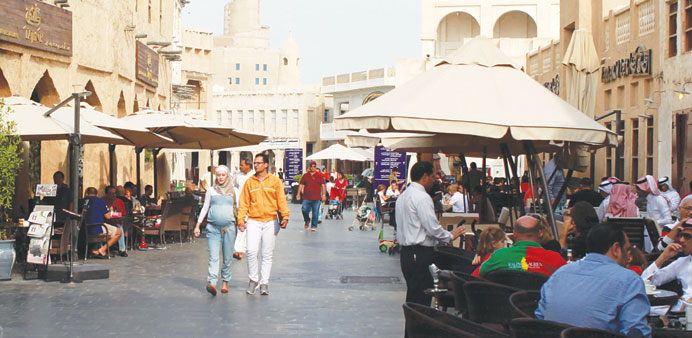Visitors walking past outdoor restaurants in the Souq Waqif market in Doha (file). Measures to curb abuses of market power in local consumer markets are expected to help keep price rises in check, according to the Ministry of Development Planning and Statistics.By Santhosh V Perumal
Business Reporter
Inflationary pressures in Qatar are “unlikely” to subside in 2014, but measures to curb abuses of market power in local consumer markets are expected to help keep price rises in check, according to the Ministry of Development Planning and Statistics.
Expecting moderate inflation in 2014 of 3.5%, a little higher than the 3.2% projected for the previous year, Qatar Economic Outlook (QEO) 2013-14 update said upward pressure on residential rentals is likely, but may soften.
Although rising material costs will exert upward pressure on project costs, the impact is “unlikely” to spill over into consumer prices, the report said.
Consumer price inflation is expected to edge up in 2014, averaging 3.5%, with a benign global inflation outlook helping to check domestic sources of inflationary pressure, it said.
Domestic inflationary pressures are expected to continue to “gently simmer,” but these will be partly offset by an expected moderation in foreign inflation, the report said.
Inflation, as measured by the change in the consumer price index (CPI), is expected to average 3.2% in 2013, up from 1.9% in 2012.
This pick-up is primarily due to rising rental costs, an index component that accounts for 32.1% of the CPI basket, it outlook said; adding non-traded services, such as entertainment, recreation and culture, also saw accelerating upward price pressures.
Stressing that inflationary pressures are unlikely to subside in 2014, the QEO update said soaring domestic demand will continue to stoke pressure on consumer prices.
“However, as benign price conditions in global commodity markets and a subdued inflation outlook in trading partner countries will soften the impact of rising prices for local goods and services, inflation is likely to remain moderate, checked, too, by heightened regulatory vigilance aimed at curbing consumer abuses,” the report said.
HH the Emir Sheikh Tamim bin Hamad al-Thani had in his first address to the 42nd ordinary session of the Advisory Council outlined the new initiatives to combat inflation and monopolies.
A continuing influx of foreign labour for Qatar’s large capital projects may push rental prices still higher, especially in affordable to middle-income housing, where availability is tighter, the update said.
Qatar’s population in 2013 and 2014 is set to burgeon at an unparalleled pace, driven largely by the new employment opportunities created by the country’s formidable pipeline of projects. Although the majority of new arrivals are lesser skilled and each has limited purchasing power, in combined terms their impact is likely to be “significant”, the report said.
Inflation could, though, pick up more quickly than these forecasts if imported inflation gathers pace (because of the unexpected commodity price rises) or if the US dollar (to which the Qatari riyal is pegged) records a nominal effective depreciation, the report cautioned.
“The damage to fiscal balances that would be caused by much lower oil prices is, in future, likely to be amplified by elevated spending commitments, which will narrow Qatar’s fiscal buffers,” it said.
Qatar’s major infrastructure programmes are expected to generate inflation in construction costs that could affect overall costs of project delivery, although these rising construction and project costs are quite distinct from consumer price pressures and inflation.
“Project cost inflation could also be aggravated as activity in Dubai ramps up to deliver Expo 2020,” QEO update said.
Rising housing costs and higher services costs the Gulf Cooperation Council countries and fast-rising prices in Iran, given the large currency depreciation since 2012, have caused regional inflation to accelerate, the report said.
‘Qatar capable of shielding economy from external shocks’
Qatar remains “susceptible” to external risks and may see strain on financial resources if geopolitical developments in the region continue unabated. But the country is capable of “shielding” its economy against such impact, according to the Ministry of Development Planning and Statistics.
“As in 2012, the main risks to the short and medium-term outlook come from outside the domestic economy – if geopolitics develop in a way to disrupt the free flow of gas and oil, the financial resources available to the state will be affected,” the Qatar Economic Outlook 2013-14 update said.
Still, Qatar could mobilise its robust financial resources and reserves to shield the economy against any such impact, it said.
The Qatar Central Bank’s foreign currency reserves, which provide ample coverage for the country’s import needs, stood at QR143bn at end-September 2013.
The increase in reserves partly reflects the use of hydrocarbon receipts to fund the investment projects domestically.
“The economic outlook for the forecast period is generally favourable, but subject to low-probability, high-impact downside risks,” it said.
However, Qatar is “susceptible” to the effect of spillovers from the world economy through trade and financial channels and its prosperity depends, self-evidently, on gas and oil production and exports.
“Any disruptions to liquefied natural gas transport from regional political tensions could have major repercussions throughout the economy,” it said.
Although an interim deal has been arrived at on Iran’s nuclear issue, Tehran recently said talks could fail if it is subject to “cohesion.” This has led to many analysts fearing that Iran might carry out an earlier threat to blockade the crucial oil shipping route of the Strait of Hormuz.
Although the availability of large financial resources provides ample cushion for Qatar to withstand such events, the protracted disruption could weaken its established competitive advantage in global gas markets, the report said.
Another hydrocarbon-related risk is a significant decline in global hydrocarbon prices for any length of time, possibly triggered by a sharp drop in emerging markets growth (which has levelled off faster than expected), the update said.
The Middle East continues to suffer from political turmoil, including escalating conflict in Syria and further social unrest in Egypt, which has held back growth and job creation, the outlook highlighted.

